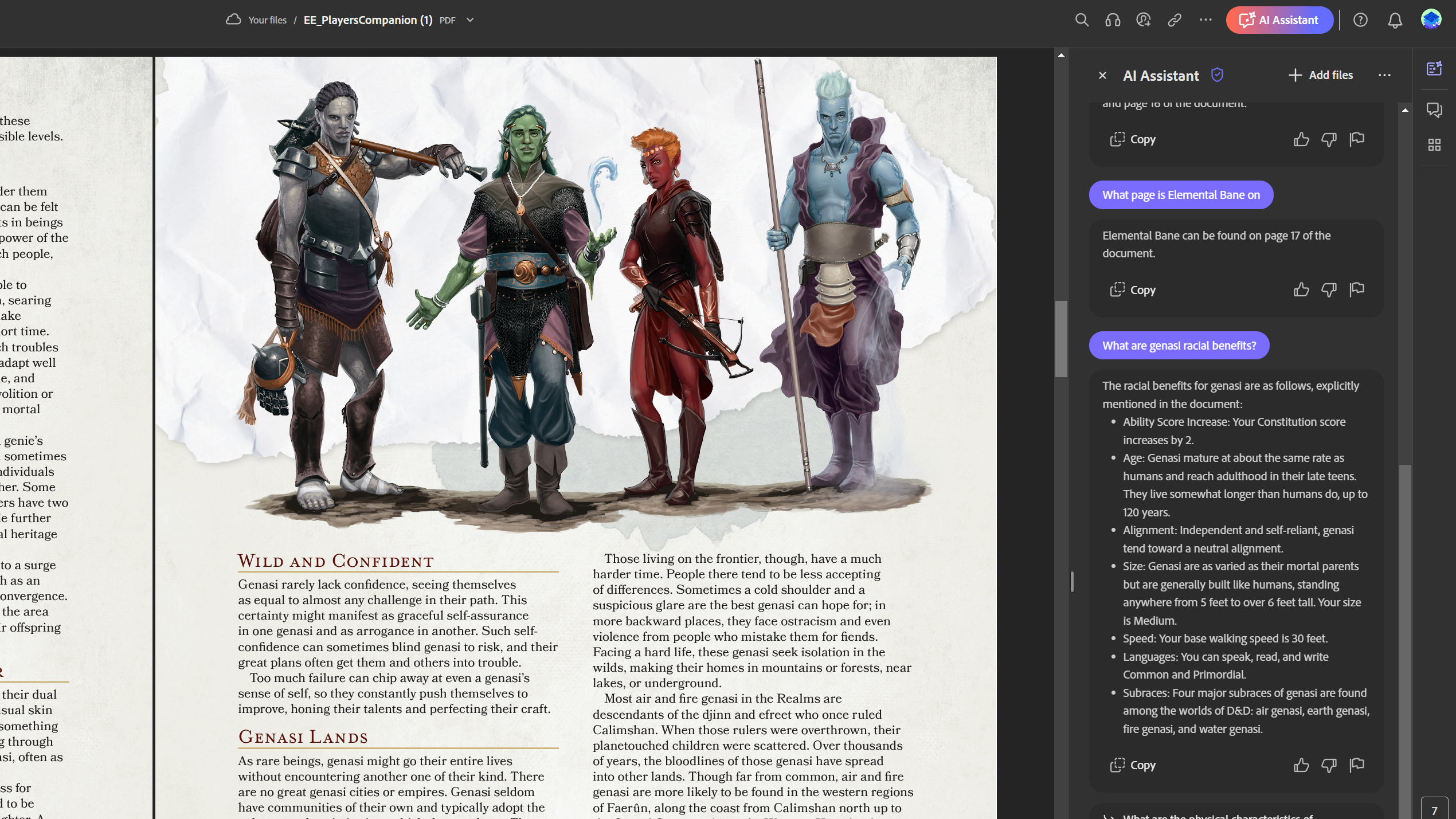I tried Adobe's AI assistant, and it could be a game-changer for D&D — here's why
Get ready to chat with your books

I grew up playing table-top role-playing games like Dungeons & Dragons, and I've spent more hours than I'd care to admit flipping through tomes looking up rules.
This is old news to anyone familiar with the hobby, but having to stop everything while someone looks up something was one of the least fun things about playing D&D as a kid. If you've ever sat and watched your friend waste 5 minutes trying to find the page with Lich King Carl's spell list on it, you'll know what I mean.
Partly this is because nobody likes a rules lawyer. (We're all here to have fun, not pass a test.). But also it's because pausing to look up things drags everyone out of the experience and sucks the life out of the game. Evolving to use digital .pdfs instead of physical manuals helped a bit because you can use a PDF reader like Adobe Acrobat to run text searches on these documents and find things (more) quickly.
But even using .pdfs on laptops and tablets at the table wasn't a complete fix because players often still have to scroll through pages and pages to find something they don't know the name of or can't remember details about. So when I saw Adobe added a new AI Assistant into Acrobat that can answer questions about documents, I was intrigued: could having an AI assistant make playing, running and designing D&D campaigns faster and easier?

It's a beautiful dream: Imagine being able to drop a digital copy of a thick reference tome into your laptop and ask Adobe's AI whatever questions you have, with confidence that you'll get accurate, specific details in a flash. It would be a huge time-saver, not just for tabletop players but students, researchers and anyone who regularly works with big documents for work.
But after trying out the Adobe AI Assistant this week, I'm afraid the reality currently falls a bit short of the dream. While the AI tool does work as advertised (usually) and can be a huge help when trying to parse or understand .pdfs, there are some limitations that keep it from being the ultimate D&D assistant.
Big potential, middling execution
To show you what I mean, I'll walk you through what's been great (and not so great) about using Adobe's AI tool so far. You don't just have to take my word for it, either — you can try it yourself for free on the Adobe AI Assistant website.
However, there are some limits on the free version. For starters, you have to create an Adobe account to ask Acrobat more than brief demo questions about a given document. Once you do sign up you only get five free requests to the AI before you have to subscribe to Adobe's AI Assistant, which costs anywhere from $4.99 to $6.99 a month during the company's current "early access pricing" period (though Amazon does offer discounts for students through September 4th that can knock it as low as $1.99/month) with price hikes likely to come in the future.
Right off the bat, I ran into some limitations you should know about when using this tool. For starters, when I tested it, the AI Assistant claimed it could only work with documents up to 200 pages long or up to 65MB in size, which means you can't chat with the AI about key texts like the D&D Dungeon Master's Guide or Player's Handbook.
(When I reached out to Adobe PR to ask about this I was told it can actually only support up to 120-page documents of up to 25MB in size, but you can try using Adobe Acrobat's Split PDF function to chop big books up into AI-digestable chunks.)
But you can still get some value out of it by using the AI to parse smaller texts, like indie RPGs and shorter adventures or expansions for big games like D&D.
However, the free version of Adobe's AI Assistant seems to be less capable than the paid version, which I also had a chance to test. When I was using the free version Adobe's AI chatbot seemed reliably incapable of answering questions like "what page is Elemental Bane on," which is a bummer since that's one of the basic things I was hoping it could help with.

But when I upgraded to the paid version, suddenly the AI Assistant could tell me what page Elemental Bane was on — albeit wrongly, repeatedly giving me page numbers that were one off from the actual page. Worse, when I asked it for the location of the spell "Bones of the Earth," the AI Assistant gave two wrong page numbers, one of which didn't exist (page 31 in a 25-page document).
Summarization is a little hit-or-miss as well. When I tried asking Adobe's AI for a summarization of what benefits choosing to play a Genasi gives a player, for example, it got the answer about 75% right but left out some key details that an inexperienced player wouldn't know were missing. So you still need human intelligence to be able to make full use of a document, AI or no.
However, there's a lot of promise here and I think this tool could actually be a game-changer for tabletop role-playing (and lots of other reference work besides) once Adobe irons out the issues.
For example, when I asked Adobe's AI Assistant to tell me what the sixth level spells for a wizard are, it nailed the answer, returning a simple list of the six spells available in the .pdf I was referencing with links to each source next to their names. They all worked, taking me directly to the page where the spell was, replete with a blue highlight box around the spell text in question.
Unfortunately, those blue highlight boxes were always a bit inaccurate, leaving out half the text and highlighting half of the preceding entry to boot. But at least I could use the AI Assistant to quickly look up what spells were available to my wizard and click to jump immediately to the page where the details are, which could be a huge time-saver for players and Dungeon Masters alike.
Adobe AI Assistant outlook
Like all the AI assistants I've tested over the last year and change since Microsoft dropped Bing with ChatGPT, Adobe's chatbot needs some work.
In my brief testing, I found that while it can handle basic summarization and data look-ups in .pdfs as well as a chatbot like Google Gemini can on the web, Adobe's AI is also prone to error. It can be helpful, and it can help you save time if you practice using it, but the rash of errors I found in the results suggest you need to know the subject pretty well and be able to fact-check the AI to get good results.
But the promise is here, and I think it's a good one. If Adobe can improve this service to the point it's reliably accurate and capable enough to answer basic questions like "what page is this on" or "how does this subject work" in a given text, the AI Assistant could truly be a game-changer for my D&D sessions.
More from Tom's Guide
Sign up to get the BEST of Tom's Guide direct to your inbox.
Get instant access to breaking news, the hottest reviews, great deals and helpful tips.

Alex Wawro is a lifelong tech and games enthusiast with more than a decade of experience covering both for outlets like Game Developer, Black Hat, and PC World magazine. A lifelong PC builder, he currently serves as a senior editor at Tom's Guide covering all things computing, from laptops and desktops to keyboards and mice.
